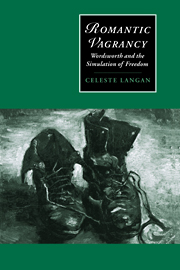Book contents
- Frontmatter
- Contents
- Acknowledgments
- List of abbreviations
- A methodological preamble
- Introduction
- 1 Rousseau plays the beggar: the last words of citizen subject
- 2 Money walks: Wordsworth and the right to wander
- 3 Walking and talking at the same time: the “two histories” of The Prelude
- 4 The walking cure
- Notes
- Works cited
- Index
- CAMBRIDGE STUDIES IN ROMANTICISM
1 - Rousseau plays the beggar: the last words of citizen subject
Published online by Cambridge University Press: 19 October 2009
- Frontmatter
- Contents
- Acknowledgments
- List of abbreviations
- A methodological preamble
- Introduction
- 1 Rousseau plays the beggar: the last words of citizen subject
- 2 Money walks: Wordsworth and the right to wander
- 3 Walking and talking at the same time: the “two histories” of The Prelude
- 4 The walking cure
- Notes
- Works cited
- Index
- CAMBRIDGE STUDIES IN ROMANTICISM
Summary
Of the features of Rousseau's corpus that compel a resurgent recognition of his critical and philosophical importance, none is as crucial nor as problematic as the imaginary fault line that separates his “political” or “public” writing from the autobiographical or ostensibly “private” documents. On the one hand, Rousseau's “literary” reputation appears to rest on the Confessions, regarded by many as marking the emergence of the modern (liberal) subject. On the other, the Social Contract is a crucial text for political theorists now engaged in rethinking the relation between the political subject of democracy and the private subject of liberalism. But the very nature of Rousseau's texts complicates any attempt so to “discipline” or separate into private and public spheres the question of the subject and the question of the citizen, the confession and the contract. Both the subject and the citizen owe their preeminence as essential units of thought in the regime of liberalism to a metaphorical logic by which one derives its justification from the other. If we are now at a point where we wish to ask, with Jean-Luc Nancy, Who Comes After the Subject?, we may wish, with Etienne Balibar, to use Rousseau to ground our response: “After the subject comes the citizen” (38).
What does it mean to “return” to Rousseau, and the citizen, in this manner? How does such a return promise to escape or at least to criticize the metaphorical interchangeability of citizen and subject? At first, such a return to Rousseau might seem to identify a postmodern critical agenda with the logic of infinite circulation. If we recognize certain ideological limitations in the category of the (epistemological) subject, nonetheless the subject of liberalism has been regarded as an improvement upon the citizen.
- Type
- Chapter
- Information
- Romantic VagrancyWordsworth and the Simulation of Freedom, pp. 31 - 58Publisher: Cambridge University PressPrint publication year: 1995

